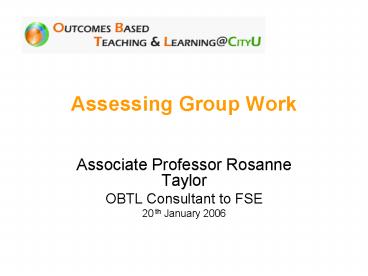Assessing Group Work PowerPoint PPT Presentation
1 / 18
Title: Assessing Group Work
1
Assessing Group Work
- Associate Professor Rosanne Taylor
- OBTL Consultant to FSE
- 20 th January 2006
2
Intended outcomes
- 1. Review why group learning tasks and
assessments are used - 2. Discuss how to plan and implement group
assessments effectively - 3. Design a group assessment task aligned to your
course ILOs
3
Why use group assessments?
List and explain 3 major ways that group
assessments can help students achieve the course
ILOs (pairs)
4
What are the problems?
- Identify some of the major pitfalls in using
group assessments to help students demonstrate
achievement of course ILOs (pairs- fours)
5
Planning group assessment
- Start small and aim for quality integration of
group work rather than quantity - Before semester
- Prepare teaching and learning activities,
materials - Develop group assessment requirements marking
criteria - Plan for how to manage monitor groups
individuals - Key factors
- Group size
- Methods of selection
- Student self-selection
- Selection on criterion, e.g. topic interest
- Random selection
- Train teaching staff
6
Preparing students
- Start of semester
- Prepare students well- explain clearly the task,
expectations - Guide students slowly through the course ILOs
reinforce how the ILOs are linked to the
teaching, learning and assessment - Explain the group work components in detail
include a why group work guide
7
Starting group work
- Get the groups off to a good start
- Help students to form groups through
non-threatening class activities - Explain stages of group formation- Forming,
norming, storming performing - Provide in class opportunities for students to
practice working in pairs, groups - Monitor encourage groups closely and offer
ongoing assistance out of class - Reinforce learning about group process as well as
product in a safe environment- its OK to make
mistakes
8
Assessing group work - students concerns
- Marking criteria need to grade on ILOs
- Product
- Product process
- Individual contribution to group
- Grade allocation
- Same group mark
- Individual mark (self, peer or staff assessment)
- What are some likely common concerns?
9
Criteria for assessing process
- If the ILO is
- contribute effectively as a member of a small
group - list ways that students could demonstrate
achievement (discuss as group) - TIPS Negotiate criteria at start
- Provide scaffolding for support
10
Criteria for assessing product
- If ILO waspresent a research paper to a
professional audience, identifying opportunities
for practical application of the findings - Students might need to
- Manage timing of each members contribution to the
talk - Build on the ideas and evidence presented
sequentially through the presentation - Allocate questions appropriate in group
11
Options for assessment
- www.cshe.unimelb.edu.au/assessinglearning
- 4 tables (assessment option, possible advantages
disadvantages) - Options for lecturer/tutor assessment of group
work product - Options for student assessment of group work
product - Options for lecturer/tutor assessment of group
work process - Options for student assessment of group work
process
12
Assessing group work in OBTL
- \
13
Intended outcomes
- 1. Review why group learning tasks and
assessments are used - 2. Discuss how to plan and implement group
assessments effectively - 3. Design a group assessment task aligned to your
course ILOs
14
References and examples
- Assessing learning in Australian Universities-
group work assessment - www.cshe.unimelb.edu.au/assessinglearning
- RMIT website on Learning, Teaching and Assessment
- http//www.rmit.edu.au/browseIDmfbqsn6uqxpg
- Learning in Groups- Derek Bok Centre for Teaching
and Learning, Harvard University - http//bokcenter.harvard.edu/docs/wigintro.html
- Oxford Brookes- group work assessment resources
- http//www.brookes.ac.uk/services/ocsd/2_learntch/
2_learnt.html - Lincoln University
- http//learn.lincoln.ac.nz/tls/groupwork/assessmen
t/guidelines.htm - www.lmt.uts.edu.au/assessment
- Levin, P. (2005). Successful Teamwork. England
Open University Press.
15
Options for lecturer assessment of group product
- Shared group mark
- Group average mark
- Individual mark - allocated task
- Individual mark - individual report
- Individual mark - exam
- Combination of group average individual mark
16
Options for student assessment of group product
- Student distribution of pool of marks
- Student allocate individual weightings
- Peer evaluation - random marker, using criteria,
moderated
17
Options for lecturer assessment of group process
- Individual mark - based on records/observation of
process - Group average mark - based on records/observation
of process - Individual mark - for paper analysing process
18
Options for student assessment of group process
- Peer evaluation - average mark, using
predetermined criteria - Self evaluation - moderated mark, using
predetermined criteria

